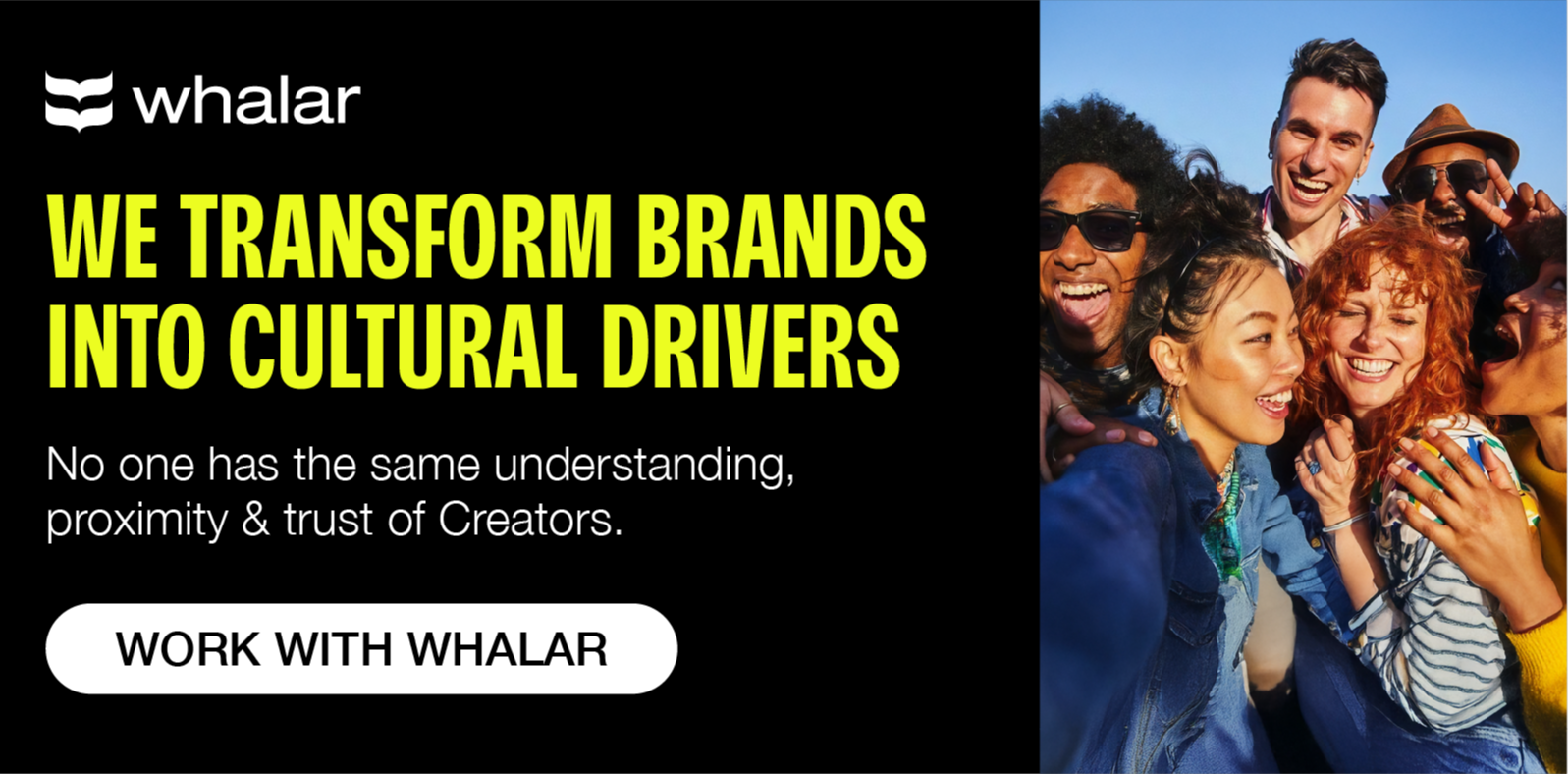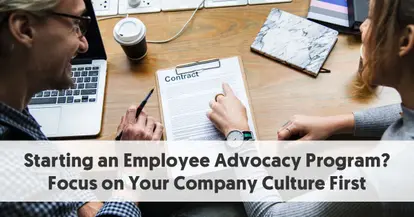Employee advocacy is getting a lot more buzz in marketing circles as companies are starting to realize its potential, both as a marketing and a recruiting tool. Though it can work for just about any kind of business, most of the excitement surrounding it is in the B2B space. That’s because influencer marketing doesn’t really apply to businesses outside the retail space. Digital marketing’s Next Big Thing doesn’t work for, say, a tech reseller or a plumbing supply company.
This is why companies are feeling the allure of employee advocacy programs while still struggling to feel its benefits. One obstacle is the idea that you’re simply implementing a program. That’s true to an extent but, before you can lay out the program’s objectives and methods, your company needs to be one which employees will truly want to advocate for. That’s something that goes deeper than programs. That’s about culture—and if you want learn how to foster the right one, you’re going to have to take a lesson from an unlikely teacher.
These Damn Kids Today
So much has been written about Millennials and the impact they’ve had on modern economies—much of it unfair. The truth is, when they’re not getting blamed for ruining one industry or another, These Damn Kids Today have somehow managed to transform business as a whole.
There should be a millenial edition of Monopoly where you just walk round the board paying rent, never able to buy anything.
— joe (@mutablejoe) November 26, 2016
Their mobile habits alone have forced businesses to rethink the way they reach and sell to customers. Influencer marketing is one of the results of that shift, turning advertising into an interactive process. Brands, influencers, and audiences collaborate in unique and fun ways all over social media. Even smaller businesses, like a family owned restaurant or an independent clothing boutique, can use the IM methodology to their advantage—using social data to find new and better customers. Millennials rewrote the rules of engagement for retail marketing.
Then they were shamed for being lazy and overspending on take-out.
But there’s a flipside to this scenario in which millennials spend money. It’s that in order to earn it, they need to work at jobs just like the rest of us. They work at businesses, for big companies and small startups. They work in tech and in healthcare, in legal offices and call centers. They are sales people, HR admins, and CEOs. They are also entrepreneurs and business owners. In seven years, they will make up 75% of the workforce. As their numbers grow, they bring an entirely new mentality and set of values to the workplace, in addition to their always-on mobile habits.
Employee Advocacy, Millennial Style
It’s not a new concept for a person to be proud of her work, or her company’s accomplishments, and want to share that with friends. And it’s always in an employee’s best interests to endorse their employer for the very basic reason of job security. With an increasingly Millennial workforce, though, this kind of information sharing is more likely to happen through social media. And within businesses that are owned, or at least managed, by this demographic, social media use is just another day at the office. Done this way, modern employee advocacy is something that wasn’t created—it just happened. It was a natural consequence of a plugged-in workforce.
For companies with a more old-school mindset, though, rolling out an employee advocacy program isn’t going to come so naturally. It may seem well and good to start encouraging—even incentivizing—your employees to start using their social feeds to promote the business. But even this is a might big ask. Think about what that even means for a moment: even if it’s a public forum, a person’s social feed is still personal space, a place where they get to share whatever it is they want to share about their lives. Requesting that they say nice things about you, even for a reward of some kind, isn’t much different than asking if they can bring you up at the bar while out with their friends. It’s a little out of place, to say the least.
More than any generation before, Millennials value working in a positive environment above all else. Fidelity Investments found in a survey that, on average, millennial workers would take a $7,600 pay cut for a new job with a better quality of work life. It’s when the professional crosses over into the personal—in a good way—that employees will happily and voluntarily endorse their employers, even at the bar. This should be the goal of your corporate culture, setting the bar for employee satisfaction at a literal bar.
Jokes aside, there’s no getting around that a successful employee advocacy program is born from a happy and satisfied staff. And since your staff is only going to get more millennial over time, there’s no time like right now to start changing your culture to attract them.
Give In To Social Media
Too many companies still view social media as a distraction at work, enforcing bans or limits on access through company equipment. This is just, all around, a terrible way to go. It accomplishes one thing and one thing only: alienating your employees by implicitly letting them know you don’t trust them to manage their time. And, given that all your employees are carrying a smartphone with a data plan, there really isn’t anything you can do to stop them. The best thing to do is to keep social media unrestricted and just start judging people on the quality of their work.
Giving in to social media doesn’t just mean letting your employees access sites while at work. It also means that being social has to be a part of your culture. That could mean encouraging employees to take part in your Facebook Page or relevant LinkedIn groups. But being social doesn’t have to be something that only happens on the outside. A communications app like Slack can act like an internal social media platform, with employees chatting, joking, sharing images and memes directly with each other or across different channels. It’s an ideal way for employees to stay connected during the day, for work and play.
This creates the kind of environment that millennials will 1) want to brag about if they work there, and 2) want to join if they don’t. Doing away with old assumptions about employee social media also makes your business instantly more attractive to potential new hires. Consider these statistics:
- 56% of millennial workers would refuse a job at a company that bans social media
- 33% say they would rather have the freedom to access social media at work than a higher salary
Let’s face it, banning or even restricting social media access is a losing proposition. It’s unenforceable and sets the wrong tone. Plus, it makes asking employees to promote the business on social media pretty awkward.
Money Isn’t Everything
We’ve already discussed two things about their workplace that millennials would take a pay cut in order to get: better quality of work like, and social media access. Well, it’s time to add something else to the list: shared values.
86% of over the over 3,000 workers surveyed stated that they’d move to a new job at lower pay if the company’s mission or values were in line with their own. For the nonprofits and charity organisations of the world, that’s great news when it comes to attracting new and future talent. But the ground gets a little shakier when your business is just basically a company with a product or service aiming to make money. Your higher salaries don’t have the draw they used to.
This, again, points to the importance of culture in implementing an employee advocacy program. Unhappy employees, even if they’re paid well, aren’t going to go around promoting their jobs—especially if they feel they’ve compromised their values to work there.
Advocacy Goes Both Ways
Want your employees to advocate for your business? Remember that nothing comes for free, and you’re going to have to advocate for your employees, too. They’re often derisively referred to as “Trophy Kids,” growing up as they did in a culture that rewarded every child for merely participating in a game or activity. The idea behind the Trophy Kid label is that they were rewarded so much for doing so little as children that they now expect constant recognition as adults for simply showing up. It almost sounds like that’s the case when you read 79% of millennials said they felt undervalued at work due to lack of recognition.
But don’t mock those Trophy Kids just yet. Especially because they’re now adults, and understand they’ve got to work and accomplish something in order to be recognised. If anything, they learned that recognition is a great motivating factor. They’re not looking for pats on the back because they did their best; but they absolutely want to be recognised when they did better than somebody else, accomplished something big, or just surpassed expectations in the execution of their jobs. That shouldn’t be looked at as a flaw; the real problem is that most companies save the praise, if any is coming, for scheduled performance reviews. Vague affirmations of a job well done every three months just have the same impact as a real time shout-out.
The Best Time is Flex Time
Maybe they grew up on a steady diet of Dolly Parton music, but millennials seem mostly agree that working 9 to 5 is no way to make a living. Technology has made it possible to do many kinds of work from anywhere at any time. Office space is expensive. Getting there is time consuming, and also expensive. Different roles within an organisation have different needs. Salespeople don’t need to be in an office at 9AM (or, really, ever, unless there’s a sales meeting). Meanwhile, IT departments are often 24-hour concerns—servers don’t always crash during business hours.
Millennials don’t want to have their time micro-managed, and don’t believe it matters what time of day the work gets done. So long as they’re doing a good job and meeting deadlines, what does it matter if they take a 3 hour lunch on a Wednesday? Why should they have to use sick time for a routine doctor’s appointment? Just as with a social media ban, the more you crack down on personal space and freedom, the more ways people will find a way around them (until they find a way out).
Flextime is no longer a new, scary, or even heretical thing. Some companies let their employees show up whenever they want and vacation for as long as they need, so long as they’re getting their job done and communicating where they’ll be. These are the kinds of things that employees will really value. You can bet that if someone finished their daily tasks early and headed out to the beach, there’d be a selfie on Instagram as soon as their toes hit the sand. And they’ll probably mention how much they love the company they work for.
Be the Advocate You Want to See in the Workplace
When you consider the list of what millennials want out of their jobs, and how fundamentally different it is than the way business has historically been conducted, it’s easy to dismiss this generation as a bunch of softies. But is that where the criticism ought to lie? Essentially, what These Damn Kids Today are saying is that they expect to be appreciated, valued, and trusted by their employers. Those aren’t things that should be considered controversial.
If you’re the sort of business owner or manager who doesn’t see it that way, that’s fine. You can run a successful business, but you’ll need to accept that your employees might not be too keen on singing your praises, or even just sharing content on your behalf. If, on the other hand, you believe that employee advocacy is crucial to your company’s success, then you’ll have no problem understanding that change has to start with you and the culture your business promotes. Once you’ve put the pieces in place for this shift, then you can get to the hard work of designing and implementing your advocacy program.
Stay tuned for our follow-up post on that topic.






